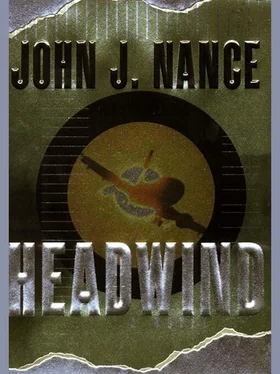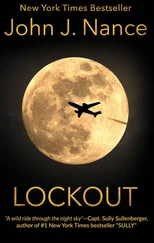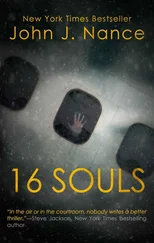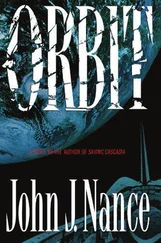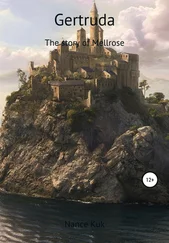The sound quality was poor but serviceable, and as Campbell had done with the first copy of the tape in Lima, he watched it from beginning to end, making absolutely certain that the words he had heard spoken were precisely as he recalled.
At the tape’s end, it appeared that Reynolds had turned off the camera just as he departed the Oval Office, leaving as the last image a bouncing shot of a long hallway outside the eastern entrance with a uniformed officer visible, standing by a mirror to one side.
Stuart had long since prepared the basic legal brief on the tape. Having met Reynolds and recorded his voice in a sworn, witnessed statement, he had evidence that the voice on the Oval Office tape and Reynolds’s voice were the same.
Campbell fumbled through his briefcase to verify the presence of the other tape, the one containing numerous network television clips of John Harris and his voice, ample proof for a cursory comparison of Harris’s voice and image on the Reynolds tape. He pulled out the transcript of the conversation, wondering if John Harris really recalled the words that had been spoken, or if he’d heard only what he’d expected to hear that day. In any event, the transcript would be devastating to Harris.
Stuart carefully put the transcript and supporting tapes away.
It had been wise, he thought, to insist that Barry Reynolds turn over the original tape. A copy would carry much less weight if examined by experts.
He thought back to his brief meeting in Baltimore with Reynolds and his surprise at Reynolds’s belief that President Miraflores had ordered him killed in retaliation for the Peruvian raid.
“Miraflores knew I had been the bag man for the operation,” Reynolds had said. “But he didn’t realize I was acting under presidential orders.”
“Who told him?” Stuart had asked.
“I did,” Reynolds had replied quietly as he sat in his living room with the drapes drawn. “Before I left the Company, we confirmed the contract on my head. I knew his death squads would get me sooner or later if he didn’t cancel the contract, but I also knew he’d never attempt to assassinate an ex-President.”
“And, even though you technically commissioned the raid, you thought he’d forgive you?”
“I knew Miraflores hated John Harris, because his brother was killed in that raid. I knew he’d trade my scalp for Harris’s.”
“So you gave him the tape you’d made for insurance.”
“I sent him a copy of the tape,” Reynolds had confirmed, “and agreed to testify if Harris was brought to trial under international law, and if he’d call off his dogs. So far, so good.”
That had been two months ago.
Campbell looked at the video camera again, a late-nineties model. He’d had no idea such technology existed before Harris’s presidency, especially in the form of a tiny camera worn concealed in something as small as a tie clip with the recorder itself in a briefcase. But Reynolds had shown him the camera in Baltimore. It seemed a little crude, but it worked.
Dublin, Ireland
John Harris had been standing at the window of Seamus Dunham’s office only half listening to the intense legal analysis being discussed behind him while his mind drifted half a world away.
He thought of Alice, as he did so many times a day. Her loss three years ago to something as simple and devastating as a medical error would always haunt him, along with the wholly illogical feeling that if he’d been at her side in the operating room, the wrong medication would not have been administered.
The images of her triggered the usual struggle to stem the tears. Outwardly, he had handled her death with the dignity that defined her life, refusing to sue a devastated medical team, forgiving the surgeon and anesthesiologist and the three nurses both in public and in private, trying to help them through the hell of public outrage and misunderstanding. There had already been a national focus on preventable medical error, but Alice’s death – the death of a former First Lady – provided a catalyst, and she would be proud… no, she was proud, he corrected himself, of the progress that had come from her loss, and the lives that had been saved in the years since with so many improvements in healthcare safety.
And now, he thought, here I am with another challenge of character. And how should I handle this, honey? Run? Stay? Fight? Fold? The options had become so terribly confusing, the black hole of fear in his middle rising up every few hours to engulf him and confuse his decisions. I was the President of the United States of America, he told himself. I have a duty to stand and fight with dignity.
But did he have a duty to submit to a thinly disguised assassination attempt wrapped disingenuously in the robes of the law?
He ached with the pain of needing her now, at this moment, to nudge him in the right direction again, as she had so many pivotal times during those incredible four years in the White House. The night he’d reached his wits’ end over the issue of running again, for instance. How, he’d asked her, could he possibly let his party down with reelection virtually guaranteed? Yet, hadn’t he placed the marrow of his credibility behind the concept of a single, six-year term, a change that would require a constitutional amendment, but benefit the nation greatly? That was a major campaign promise to the American people. How could he walk away from that?
Alice had joined him quietly in the Oval after chasing out the Chief of Staff and shutting the door. Together they had stood at the window overlooking the Rose Garden for the longest time, watching the fountain in the distance and the Washington Monument as she squeezed his arm and said nothing.
“What do I do?” he asked her at last. “How can I walk away from this responsibility?”
She had smiled at him and pointed to the lighted spire of the monument.
“George set the example, didn’t he?” she said. “His greatness was teaching us by example that principles would guide and protect this nation when the politics of the moment had been long forgotten.”
He remembered the weight that had lifted from his shoulders then, and the ease of making the announcement that shocked the nation and made him an outcast in his own party.
The job was still undone, he reminded himself. There was still no single six-year term. Perhaps living to keep fighting that battle justified turning tail and running. Perhaps not.
But there was one thing that loomed always in his mind, accepted and unquestioned and unquenchable: how empty the world was without her.
I miss you, honey! he thought, almost losing the battle to fight back the tears.
Dublin, Ireland – Wednesday – 5:30 P.M.
The sun was hanging low in the western sky when Jay Reinhart emerged from Seamus Dunham’s building with the others close behind. He forced himself to be aware of the beauty before him: the diffused red hues of the angled sunlight igniting the glow of reddish masonry, firing the reflective street signs, and forcing the hapless westbound drivers to navigate with hands held tenuously before their eyes. The city was shifting from the lethargy of a lazy afternoon to the energy of a St. Patrick’s Day celebration, its people charging about to various purposes with an infectious optimism that seemed wholly undampered by the inherent knowledge that not every human circumstance within Dublin’s fair city was positive. There was to be a grand and lengthy fireworks display after dark at the east end of the city where the River Liffey empties into the bay, and the traffic in the heart of Dublin was already building.
Jay loved sunsets, but there was a limit to what one could enjoy when the thunderheads of circumstance loomed large on the horizon. Yet the ruddy resonance of a city at sunset somehow demanded appreciation, even if it was an item of faith to be stored and valued later in the hoped-for absence of challenge and peril.
Читать дальше
